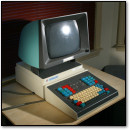[ Retro Scan of the Week ] Sharp Retro Scanner
October 15th, 2007 by Benj Edwards
Retro Scanner of the Week? For only $9,639.64 (in today’s dollars), you could buy a Sharp flatbed scanner in 1989 that could digitize images in 260,000 colors at up to 300 DPI. Why 260,000? I have no idea, but any color support at all made this this one heck of a high quality scanner for the time.
[ From CDA Computer Sales Fall/Winter 1989 Catalog ]
Even today, most 11×17″ scanners still cost an arm and a leg; users have always paid a premium for that much glass real estate. But current models offer much higher resolutions and color depths in a far-sleeker form factor than this one.
If you use this image on your site, please support “Retro Scan of the Week” by giving us obvious credit for the original scan and entry. Thanks.






October 15th, 2007 at 9:54 pm
260,000 colors? That probably means that the actual count is 262,144, which is 2^18. Thus, probably 6 bits allocated for each color component, red – green – blue. The exact color count probably looked too technical to the folks in marketing.
Computer geeks just recognize powers of 2 like that.
October 15th, 2007 at 10:38 pm
I suspected it was a roughly power-of-two thing, but I wanted to leave it to you guys to figure it out for me. Still, 6 bits for each color is kinda weird, don’t you think?
Still, 6 bits for each color is kinda weird, don’t you think?
October 15th, 2007 at 10:50 pm
No weirder than the original IBM VGA. Remember mode 13h: 320x200x256 colors? Each of the 256 possible colors indexed into a table of RGB values, where each component was 6 bits. Thus, the IBM VGA had a total palette of 262,144 colors.
October 16th, 2007 at 1:28 pm
I don’t remember it by name, but I’m glad that you do. 64 hues per color is an interesting choice. It seemed arbitrary to me, but I guess it’s just as arbitrary as any other color depth.
October 16th, 2007 at 2:12 pm
Speaking of powers of two and odd color palettes, does anyone know why the NES had a palette of 52 colors?
October 16th, 2007 at 3:48 pm
@zoyous: I don’t remember exactly, but the NES’ palette specs have to do with some electrical engineering details. Wikipedia currently reports that the hardware had 48 RGB colors and 5 grey levels (so 53 colors total). However, I remember that some NES hackers have put together some custom ROMs which do special timing tricks, the upshot of which are to display many more colors (10s, maybe 100s of thousands) on screen at once. So the 52 or whatever limitation was not absolute.
October 20th, 2007 at 1:20 pm
Thanks Mike. I’d like to see some screenshots of those hacks!
I always thought it was interesting that there was so much debate among me and my friends about which of the 8-bit systems had “better graphics” and could display more colors, when the Atari 2600 could actually display more colors than either the SMS or the NES… an ability which Activision often utilized for their beautiful background sunsets in many of their titles.
October 20th, 2007 at 11:57 pm
Wow, $549 extra to hook it to a Mac! I wonder what type of interface it natively came with? Some flavor of SCSI? Makes me thankful for standardized interfaces.
October 21st, 2007 at 11:01 am
zoyous, I believe that the neat rainbow effect on certain Atari 2600 games is due to an “undocumented feature” (flaw in the TIA chip) that allows the programmer to change colors mid-scan line as it draws the screen. That’s why the rainbow effects were usually limited to the background or simple shapes. Feel free to clarify this, anyone. I’m just going by what I remember reading recently.
And Moondog, the Macs of the time all had SCSI interfaces, so I’m not sure what the scanner’s native interface was. Maybe a parallel port? That’s what my old PC scanners used to use.